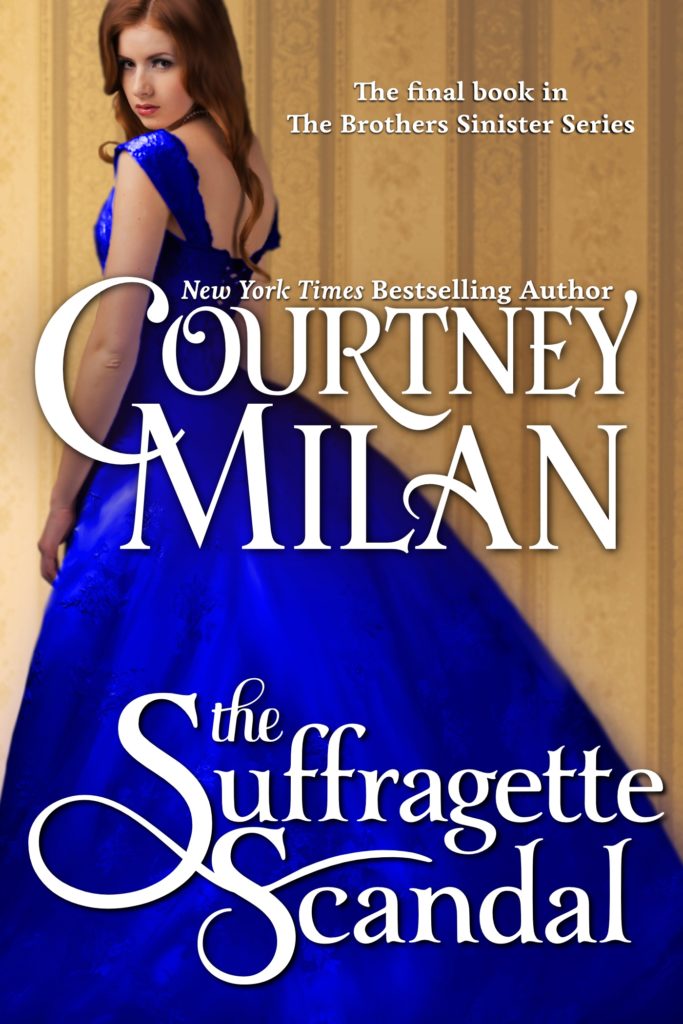
The Suffragette Scandal
Buy it
ebook: amazon | apple | nook | kobo | google | smashwordsprint: amazon |
audio: audible | amazon | iTunes
library: overdrive
Read More
about the book | excerpt | code name | content notesAn idealistic suffragette...
Miss Frederica "Free" Marshall has put her heart and soul into her newspaper, known for its outspoken support of women's rights. Naturally, her enemies are intent on destroying her business and silencing her for good. Free refuses to be at the end of her rope...but she needs more rope, and she needs it now.
...a jaded scoundrel...
Edward Clark's aristocratic family abandoned him to die in a war-torn land, so he survived the only way he could: by becoming a rogue and a first-class forger. When the same family that left him for dead vows to ruin Miss Marshall, he offers his help. So what if he has to lie to her? She's only a pawn to use in his revenge.
...and a scandal seven years in the making.
But the irrepressible Miss Marshall soon enchants Edward. By the time he realizes that his cynical heart is hers, it's too late. The only way to thwart her enemies is to reveal his scandalous past...and once the woman he loves realizes how much he's lied to her, he'll lose her forever.
The Brothers Sinister Series Reading Order
2. The Heiress Effect | 3. The Countess Conspiracy | 4. The Suffragette Scandal | 4½. Talk Sweetly to Me
...or get all seven volumes in one boxed set
Reviews
“We LOVED this book. If we could get away with it, we would submit this entire review in CAPSLOCK because the book was MADE OF WIN.”
—Smart Bitches, Trashy Books
“Another stellar offering from Courtney Milan, quite possibly the best in the whole series.”
—Tessa's Books and Tea Room
“Another wonderful, thought-provoking historical romance from the awesome Courtney Milan; she really can do no wrong when it comes to romance.”
—The Book Adventures


Code Name
All my books get code names. And this one gets the code name of “Free breaks the author.”
I don’t want to be the kind of author who keeps adding books to her series. I know I do it with novellas—or at least, I did it with A Kiss for Midwinter, which was wholly unplanned—but entire books? No. Series have beginnings and middles and ends, and that is that!
One of my goals in writing the Brothers Sinister series was that I’d be able to explore a slightly new set of family dynamics in every book, so that even though you’d see the same characters (and they would play roles), there would also be new conflicts, new friendships, new families in every book.
I did not realize that this meant that sometimes I’d write characters that would be pushy and demanding and I would fall in love with them and close my eyes and not want to say farewell. I resisted. Oh, I resisted. I was not going to be That Author who kept Expanding her Series Forever.
Free kept on keeping on.
There’s a line in The Heiress Effect that I wrote and looked at and then cursed mightily, because if I put that line in the book, there would be no way that she wouldn't end up with her own book. But how could I leave it out? I couldn’t.
This book used to be known as The Mistress Rebellion. The farther I got into this book, the less appropriate the title seemed. It became so horribly inappropriate that I changed it.
Excerpt
London, March 1877
Edward Clark was disgusted with himself.
It was one thing to do a man a favor. It was another entirely to take it this far—for Edward to shoulder his way through the shouting crowd on the banks of the river, jostling with other men for position. And for what purpose? So he could see a pair of boats come around the bend of the Thames? He hadn’t even known he was acquainted with a member of the Cambridge crew until he’d glanced at a newspaper this morning.
And yet here he was. Waiting. Like everyone around him, he leaned forward intently. Like them, he caught his breath when he glimpsed the first boat. But the crew on board was attired in dark blue, and cries of “Oxford, Oxford!” rose in a tumultuous roar around him. He sank back on his heels—but before he had a chance to relax, another boat came into view, rowed by men in light blue. Competing shouts rang out.
Edward didn’t cheer. He focused on the Cambridge boat intently.
It had been almost a decade since he’d seen Stephen Shaughnessy. Back then, Stephen had been a boy. An annoyance, as ever-present as a mosquito. Edward had expected to feel a wave of nostalgia when the man came into sight. Maybe the bitter tug of guilt.
But he couldn’t put a name to the feelings that assailed him—dark, indistinct things that pulled at him uncomfortably, leaving his muscles tensed and a phantom itch in his smallest finger. They weren’t proper emotions at all. He had only the sense that it was about to storm, and yet there wasn’t a cloud in the sky.
Stephen—Edward knew he was the third man in the Cambridge boat from the papers—was nothing but an indistinct blot of dark hair and moving muscle. Scarcely a reason for Edward to leave his comfortable home in Toulouse, to risk the complacent life he’d fashioned for himself.
He’d done it anyway. He’d tried to eradicate all his idealism, but apparently he did still hold on to a few foolish principles.
Around him, the crowd’s expectant cheers grew louder, more boisterous. The race was close; the light blue Cambridge shirts crept up on Oxford. Edward felt like a dark rock, solid and unmoving in the midst of a froth of excitement.
Nothing represented his former brave, irrelevant principles more completely than the people mustered along the banks of the river. Everyone else concentrated on what was—for the moment—the most important thing in the universe: the men in their boats, struggling for speed in the choppy water. Here, there were no ethical morasses. In a universe of uncertainty, this one contest was set in stone. There was only black and white, right and wrong, Cambridge and Oxford.
And Oxford was ahead by a quarter length.
Not everyone was excited. To his right, back a few paces, a woman stood, scarcely hiding her boredom. She was dressed in a fussy, lacy gown that made her look like a sugar-spun confection. Pretty enough to look at, but he suspected she would hurt his teeth if he tried to partake. She clung to the arm of a florid-faced man, and glanced riverward every half minute or so—the certain look of a woman who’d been dragged out here and was doing her best to feign interest.
Most of the people standing back from the riverbank weren’t even trying to hide their boredom. The race was the place to be, so they’d come to see and be seen. He should join them, leave this prime position at the water’s edge for someone who cared.
But that was when his eye landed on one particular woman. She wasn’t standing behind the crowd out of ennui; she was perched on a stool, the better to see the proceedings. She wore a dark skirt and a white shirtwaist. But her jacket had a decidedly mannish flair to it—strong lines, military braid at the cuffs, and epaulettes at the shoulders. She wore a man’s bowler hat. A length of fabric in that odd shade of light bluish-green that was known as Cambridge Blue was knotted around her neck in a fair imitation of a cravat. She wasn’t feigning interest in the race; she was interested. She leaned forward, every bit as intent as the most avid student, as if she could push the craft forward with the power of her mind.
Edward had intended to drop back, but when he picked his way through the crowds at the banks, it turned out to not be a retreat. He found himself drifting toward the woman as if he were a satellite being drawn into orbit around her. As he got closer, he saw wisps of auburn hair peeking out from under her hat.
She watched the proceedings with a concentration so intent that she didn’t even notice him coming to stand a few feet from her. She simply pushed up on her tiptoes, fists clenched at her side, eyes fixed on the race.
He could see the river from the corner of his eye. The rowers were closing in on the finish. The woman leaned forward, raising a fist as if to cheer—and then gasped in sudden surprise.
Edward turned back to the river. He scarcely had a chance to see what happened. A dark object flew through the air from the opposite bank; the shouts of encouragement turned to outrage. And then the thing—whatever it was—hit the Cambridge boat right on Stephen’s position. It burst apart, and Edward saw a splash of vivid orange.
He’d been right. There was a storm coming. Edward stepped forward, his jaw clenched, a rising fury encompassing him. But there was nothing he could do—not here, not on the banks of the river.
Now he remembered why he hated England. He hadn’t felt this helpless in almost a decade, not since his father had ordered Stephen and Patrick stripped to the waist and whipped in front of him. This was why he’d come back. After all these years, he finally had a chance to do something about the anger he’d buried.
The boat was close enough now that Edward could see Stephen miss a beat, wipe his face. Some kind of an orange dye in a brittle shell had been lobbed at him.
“Oh, infamous!” shouted the woman in the cravat. “Don’t let them take you down, Stephen. Show them!”
He turned back to her. She knew Stephen? The mystery deepened. Here she was, rigged out in Cambridge colors, cheering for Stephen as if she had every right to do so. He had no idea who she was. She might be his fiancée, although he’d not heard of a betrothal. She wasn’t family; that he knew for certain.
Edward couldn’t make out Stephen’s expression at this distance, but he didn’t need to. There was a determination to the set of his shoulders, one Edward recognized all too well.
He’d been best friends with Stephen’s elder brother. Stephen had been five years younger—a persistent extra at best, an annoying hanger-on at worst. He’d followed the older boys around looking precisely as he did now: determined that he would not be excluded. The harder they had tried to leave him, the more he’d attached himself. Apparently that stubbornness hadn’t changed, because now he pulled harder. The Cambridge boat slid ahead a quarter of a length, and then another. And then they were in the lead, sliding past the judge’s boat to the roar of the crowd.
“That’ll show those bloody bounders,” the woman next to him muttered. She put two fingers to her lips and gave a sharp, piercing whistle of approval.
Nothing demure about her at all. Ladies in England had changed since he’d been gone. He found them much improved.
She removed her fingers and, for the first time, she noticed him. She raised an eyebrow, as if daring him to remonstrate with her.
Not a chance. He turned to her.
“Let me guess. Your brother?” He gestured toward Stephen. He knew she was no relation, but he had no wish to reveal his own connection. “What a disgrace that was.”
Her nostrils flared. “No more than some of the other things… Well, never mind.”
Other things? So Patrick had been right. Stephen was in trouble, and there might be something Edward could do about it.
“And no,” the woman continued, “he’s not my brother.”
There was no ring on her finger. “There must be a brother somewhere,” he mused. “Someone is responsible for all this Cambridge spirit.” He gestured to her cravat.
The corner of her mouth tilted up, as if he’d said something extremely funny, and she was afraid to laugh for fear of hurting his feelings.
“My brother did go to Cambridge,” she admitted. “But that was decades ago. I don’t cheer on his behalf.”
“So you developed a taste for sport while your brother was…” He stopped. He wasn’t good at judging age; he never had been. But he doubted she’d been anything other than a tiny child decades ago.
She did snicker at that.
He tried again. “You know one of the rowers, the one who was spattered with dye. You shouted his name…?”
“Oh, yes. Stephen Shaughnessy. We Cambridge misfits ought to keep some kind of camaraderie.”
“Misfits?” He frowned, and then realized that was not the most surprising word she’d used. “We?”
“You saw what they did.” A hand went to her hip, resting against the white brocade of her jacket. “If you know the name Stephen Shaughnessy, you can guess why he’s not universally admired. As for me, you can stop gently probing. I’m technically not a Cambridge misfit—not any longer. I graduated from the Girton College for Women a few years back.”
It had been a long time since he’d been taken by surprise. He knew, vaguely, that Girton existed and women had graduated from it. But there weren’t many of them; the number was so small as to be almost nonexistent. He blinked and took her in again—that mannish blazer, that cravat knotted around her neck. Oh, women had changed since he’d left England.
“You’re a suffragette,” he said flatly.
She blew out a puff of air, and he felt an almost physical blow. The wind had blown strands of her hair loose from under her hat. It shone a brilliant auburn in the sun. That blazer ought to have made her look masculine. Instead, the cut accentuated her curves rather than hiding them, bringing every last difference between her body and a man’s into prominence. But it was her smile that made her dangerous—a smile that said she could take on the entire world, and she’d do it twice before breakfast.
She wagged a finger at him. “You’re mispronouncing that word.”
“Your pardon?” He groped, trying to remember what he’d said. “Suffragette? How does one pronounce it, then?”
“Suffragette,” she said, “is pronounced with an exclamation point at the end. Like this: ‘Huzzah! Suffragettes!’”
The moon could ignore the earth more easily than he could turn away from her. It took every ounce of willpower he had not to smile at that. Instead, he gave her a level look. “I don’t pronounce anything with exclamation points.”
“No?” She shrugged this away. “Then there’s no time like the present to start. Repeat after me: ‘Let’s hear three cheers for the women’s vote!’”
He could feel his amusement spilling out on his face despite his best efforts. He clamped his lips into a straight line and lowered his voice. “No,” he told her. “Cheering is entirely beyond my capabilities.”
“Oh, too bad.” Her tone was sympathetic, but her eyes were mocking. “I see now. You’re a womanthrope.”
He’d never heard the word before, but the meaning was all too clear. She’d judged him to be just like every other man in England. Foolish to protest that he was different. Foolish to care what this unknown woman thought of him.
He spoke anyway. “No. I am a realist. Likely you’ve never met my sort before.”
“Oh, I’m sure I have.” She rolled her eyes. “I’ve heard everything. Let me see. You believe that women will vote for the handsomest candidates without using their faculties of reason. Is that the size of your realism?”
He met her accusing gaze with an annoyed look of his own. “Do I look like a fool? I don’t see any reason for women not to vote; you’re no stupider, on average, than the typical man. If there were any fairness in the world, suffragettes would succeed in all their political aims. But the world is not fair. You’re going to spend your entire life fighting for gains that will be lost in political bickering ten years after they’ve been achieved. That’s why I won’t spare you three cheers. They’ll serve no purpose but to waste my breath.”
She looked at him for a moment. Really looked at him, as if she were seeing him for the first time rather than imagining a man-shaped…womanthrope in his stead.
“Good heavens.” She reached into a pocket in her skirt. “You’re right. I haven’t met anyone like you.”
She looked him over again, and this time there was no mistaking that slow head-to-toe perusal. His heart gave an odd little thump.
And then she smiled at him. “Well, Monsieur le Realist. Call on me if you ever find yourself in need of an exclamation point. I have an entire box of them.”
It took him a moment to realize she was handing him a card. She slipped it between the gloved fingers of his right hand; he caught it with his left before it could fall to the ground. The type was plain and unassuming, with none of the little decorations or curly scripts one expected from a woman’s calling card. But then, this was a card of business; no woman had ever given him one of those before.
Frederica Marshall, B.A.
Owner and Editrix-in-Chief
Women’s Free Press
By women—for women—about women
When he looked up, she’d already gone. He caught a glimpse of her yards away, wending her way through the crowds, her stool under her arm.
And then the swirling throng swallowed her and he was left with nothing but her card.


